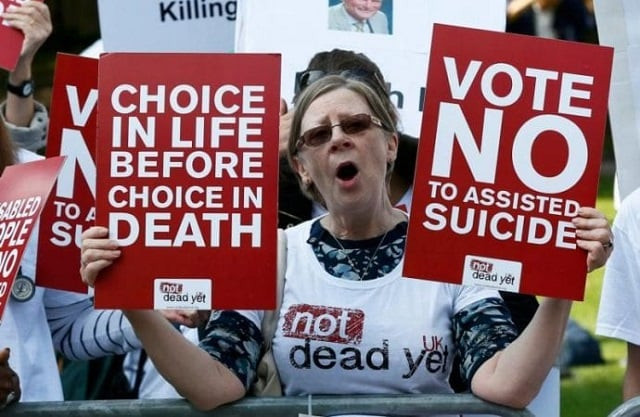Muslims, Jews and Christians sign joint paper against euthanasia
The three Abrahamic monotheistic religions are in complete agreement in their approach to end-of-life situations

File photo of a demonstrator against assisted suicide in a protest outside Parliament in London Sept. 11, 2015 (Photo: Reuters)
"The three Abrahamic monotheistic religions share common goals and are in complete agreement in their approach to end-of-life situations," the document said.
"Euthanasia and physician-assisted suicide are inherently and consequentially morally and religiously wrong and should be forbidden with no exceptions."
"Any pressure upon dying patients to end their lives by active and deliberate actions is categorically rejected," it added.
German court hears debate over commercial euthanasia
It was signed at the Vatican by David Rosen for the American Jewish Committee, Vincenzo Paglia for the Vatican, a representative for the Orthodox Church, and Samsul Anwar from the Indonesian Muhammadiyah, an Islamic social and cultural association.
The idea came from Avraham Steinberg, co-president of the Israeli National Council on Bioethics.
"I think it's by itself a historic event that the three major religions come together, talk to each other, agree on something and even sign on it," Steinberg told a press conference
Paglia, who is president of of the Pontifical Academy for Life, added that while death could not always be avoided, "we don't want to help it on its dirty job."
Wildlife dept gives nod to mercy killing of paralysed lions
Finally, Marsudi Syuhud, secretary-general of the influential Islamic association Nahdlatul Ulama, said: "Protecting life is one of the purposes of Islamic law, that's why we don't stop protecting life until the end of our life."
The document urged medical personnel to listen to their conscience, saying: "No health care provider should be coerced or pressured to either directly or indirectly assist in the deliberate and intentional death of a patient through assisted suicide or any form of euthanasia, especially when it is against the religious beliefs of the provider."
"Moral objections regarding issues of life and death certainly fall into the category of conscientious objection that should be universally respected," it added.



















COMMENTS
Comments are moderated and generally will be posted if they are on-topic and not abusive.
For more information, please see our Comments FAQ